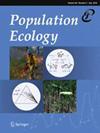The timescale of environmental fluctuations determines the competitive advantages of phenotypic plasticity and rapid evolution
IF 1.1
4区 环境科学与生态学
Q4 ECOLOGY
引用次数: 0
Abstract
Organisms can respond to fluctuating environments by phenotypic plasticity and rapid evolution, both occurring on similar timescales to the environmental fluctuations. Because each adaptation mechanism has been independently studied, the effects of different adaptation mechanisms on ecological dynamics are not well understood. Here, using mathematical modeling, we compared the advantages of phenotypic plasticity and rapid evolution under conditions where the environment fluctuated between two states on various timescales. The results indicate that the advantages of phenotypic plasticity under environmental fluctuations on different timescales depend on the cost and the speed of plasticity. Both the speed of plastic adaptation and the cost of plasticity affect competition results, while the quantitative effects of them vary depending on the timescales. When the environment fluctuates on short timescales, the two populations with evolution and plasticity coexist, although the population with evolution is dominant. On moderate timescales, the two populations also coexist; however, the population with plasticity becomes dominant. On long timescales, whether the population with phenotypic plasticity or evolution is more advantageous depended on the cost of plasticity. Moreover,环境波动的时间尺度决定了表型可塑性和快速进化的竞争优势
生物可以通过表型可塑性和快速进化来应对波动的环境,两者都发生在与环境波动相似的时间尺度上。由于每一种适应机制都是独立研究的,因此不同的适应机制对生态动力学的影响尚不清楚。在这里,我们利用数学模型,比较了在不同时间尺度上环境在两种状态之间波动的条件下,表型可塑性和快速进化的优势。结果表明,在不同时间尺度的环境波动下,表型可塑性的优势取决于可塑性的成本和速度。塑性适应的速度和塑性成本都影响竞争结果,但它们的定量效应随时间尺度的变化而变化。当环境在短时间尺度上波动时,进化种群和可塑性种群共存,但进化种群占优势。在适当的时间尺度上,这两个种群也共存;然而,具有可塑性的种群占主导地位。在长时间尺度上,具有表型可塑性或进化的种群是否更有利取决于可塑性的成本。此外,
本文章由计算机程序翻译,如有差异,请以英文原文为准。
求助全文
约1分钟内获得全文
求助全文
来源期刊

Population Ecology
环境科学-生态学
CiteScore
3.90
自引率
11.80%
发文量
41
审稿时长
18-36 weeks
期刊介绍:
Population Ecology, formerly known as Researches on Population Ecology launched in Dec 1952, is the official journal of the Society of Population Ecology. Population Ecology publishes original research articles and reviews (including invited reviews) on various aspects of population ecology, from the individual to the community level. Among the specific fields included are population dynamics and distribution, evolutionary ecology, ecological genetics, theoretical models, conservation biology, agroecosystem studies, and bioresource management. Manuscripts should contain new results of empirical and/or theoretical investigations concerning facts, patterns, processes, mechanisms or concepts of population ecology; those purely descriptive in nature are not suitable for this journal. All manuscripts are reviewed anonymously by two or more referees, and the final editorial decision is made by the Chief Editor or an Associate Editor based on the referees'' evaluations.
 求助内容:
求助内容: 应助结果提醒方式:
应助结果提醒方式:


